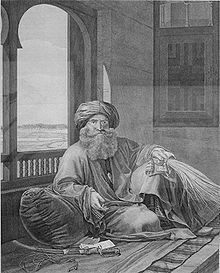- Murad Bey
-
Murad Bey (c. 1750 – 1801) was an Egyptian Mamluk chieftain (Bey), cavalry commander and joint ruler of Egypt with Ibrahim Bey. He was of Georgian origin having been born in Tbilisi.[1]
Following his defeat at the hands of Napoleon's armies at the Battle of the Pyramids, Murad fled to Upper Egypt, mounting a brief guerrilla campaign that staved off Desaix for a year. It was while pursuing Murad Bey into Upper Egypt that the French discovered the monuments at Dendera, Thebes, Edfu and Philae.
In 1800, Murad made peace with Jean Baptiste Kléber, and agreed to garrison Cairo, but died of bubonic plague on his journey there.[1]
References
Categories:- Egyptian military personnel
- Deaths from bubonic plague
- Ottoman Georgians
- 1750 births
- 1801 deaths
- Egyptian nobility
- Ottoman political people
- Slaves of the Muslim world
- Ottoman military leaders of the French Revolutionary Wars
- African military personnel stubs
- Egyptian people stubs
Wikimedia Foundation. 2010.

